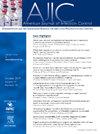Effectiveness of sensing gloves–applied virtual reality education system on hand hygiene practice: A randomized controlled trial
IF 3.8
3区 医学
Q2 INFECTIOUS DISEASES
引用次数: 0
Abstract
Background
We developed a virtual reality (VR) education system and evaluated its clinical utility for promoting hand hygiene practices.
Methods
This prospective, 2-week, randomized controlled study conducted at Okayama University Hospital, Japan, from November 2023 to January 2024, involved 22 participants (18 medical students and 4 residents). A fully immersive 360° VR system (VIVE Pro Eye) using a head-mounted display and sensing gloves was used to develop 3 health care tasks in a virtual patient room—Environmental Cleaning, Gauze Exchange, and Urine Collection. After monitoring all participants' baseline usage data of portable hand-rubbing alcohol in the first week, we randomly assigned them into 1:1 groups (VR training and video lecture groups). The primary outcome was differences in hand-rubbed alcohol use before and after intervention.
Results
Before the intervention, alcohol use did not significantly differ between both groups. After the intervention, a significant increase in alcohol use was observed in the VR training group (median: 8.2 g vs 16.2 g; P = .019) but not in the video lecture group.
Conclusions
Our immersive 360° VR education system enhanced hand hygiene practices. Infection prevention and control practitioners and digital technology experts must collaborate to advance the development of superior educational devices and content.
感知手套应用虚拟现实教育系统对手部卫生实践的效果:随机对照试验
简介:我们开发了一套虚拟现实(VR)教育系统,并评估了其在促进手部卫生实践方面的临床实用性:我们开发了一套虚拟现实(VR)教育系统,并对其在促进手部卫生实践方面的临床实用性进行了评估:这项前瞻性、为期两周的随机对照研究于 2023 年 11 月至 2024 年 1 月在日本冈山大学医院进行,共有 22 名参与者(18 名医学生和 4 名住院医师)。该研究使用了一个完全沉浸式 360° VR 系统(VIVE Pro Eye),该系统使用了头戴式显示器和传感手套,在虚拟病房中开发了三项医疗保健任务--环境清洁、纱布交换和尿液收集。在第一周监测所有参与者使用便携式擦手酒精的基线数据后,我们将他们随机分配到 1:1 组(VR 培训组和视频讲座组)。主要结果是干预前后手擦酒精使用量的差异:结果:干预前,两组的酒精使用量没有明显差异。干预后,观察到 VR 培训组的酒精使用量明显增加(中位数:8.2 克 vs. 16.2 克;P=0.019),但视频讲座组没有增加:我们的沉浸式 360° VR 教育系统增强了手部卫生实践。感染预防与控制从业人员和数字技术专家必须通力合作,共同推进优质教育设备和内容的开发。
本文章由计算机程序翻译,如有差异,请以英文原文为准。
求助全文
约1分钟内获得全文
求助全文
来源期刊
CiteScore
7.40
自引率
4.10%
发文量
479
审稿时长
24 days
期刊介绍:
AJIC covers key topics and issues in infection control and epidemiology. Infection control professionals, including physicians, nurses, and epidemiologists, rely on AJIC for peer-reviewed articles covering clinical topics as well as original research. As the official publication of the Association for Professionals in Infection Control and Epidemiology (APIC)

 求助内容:
求助内容: 应助结果提醒方式:
应助结果提醒方式:


